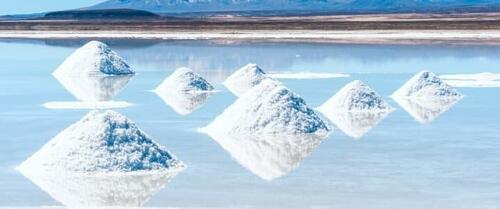Environmentalists Have Turned On The Lithium Industry
By Felicity Bradstock of Oilprice.com
The world is preparing for a lithium boom, mainly due to the anticipated increase in EV production and uptake over the coming decades. Several celebrities and tech billionaires are backing lithium mining in a bid to support a green transition. In addition, many countries are rapidly developing their mining capabilities to establish their place in the global minerals and metals market, which is expected to expand significantly over the next decade.
However, environmentalists are concerned with the damage the rapid expansion that mining operations could cause to the environment. In addition, a spate of viral social media posts has brought negative attention to a mineral that the public knows little about, beyond hearing it in the context of lithium-ion batteries. If we are to expect substantial development in the lithium industry in the coming years, greater awareness must be raised around the minerals industry so producers and manufacturers can gain public support and encourage consumer market expansion. Furthermore, mining and energy companies must address environmental concerns to ensure their operations are in line with the aims of a green transition, as countries and companies around the world strive for net-zero and to do less environmental harm.
In 2021, Australia was the biggest miner of lithium, producing 55,000 metric tonnes, with reserves totaling around 5.7 million metric tonnes. It was followed by Chile, which produced 26,000 metric tonnes, China, Argentina, Brazil, Zimbabwe, and Portugal. Although these figures could shift significantly as Chile, Argentina, and Bolivia invest heavily in the development of a lithium triangle in South America.
Argentina accounts for around 21 percent of the world’s lithium reserves, and while it’s relatively new on the scene compared to Chile, which already has a well-established lithium mining industry, it is now investing heavily in the sector. Greater demand for electric vehicles (EVs) and lithium-ion batteries for electronic products is expected to lead to a lithium boom, with international pressure for a boost in mining activities already mounting. At present, Argentina has two lithium mines in operation, but a further 13 are planned with dozens more under consideration, making it the world’s largest lithium pipeline.
The International Energy Agency (IEA) anticipates a 40-fold increase in lithium demand by 2040. Traditionally, lithium mines require a two-year-long evaporation process, where lithium is separated from salty brines. At present, the production of one metric tonne of lithium requires 500,000 gallons of water, with Chile’s lithium mining consuming around 65 percent of the region’s water. However, several mining firms are investing in the development of alternative methods that require less time and water to be used in the extraction process, through direct lithium extraction (DLE), to make it more profitable and less harmful to the environment.
As mining firms and governments around the world invest in expanding their lithium operations, many question whether there is enough of the mineral to produce the number of batteries required to achieve net zero. Estimates suggest that around 2 billion EVs need to be produced to reach this goal. Lithium production totaled around 90.7 million kg worldwide last year, and one EV battery holds around 8kg of lithium. Meanwhile, global reserves are thought to total around 22 million tonnes (20 billion kg). Approximately enough lithium to manufacture 11.4 million EV batteries was produced in 2021. If all of the world’s lithium were used for EVs, it could contribute to the production of around 2.5 billion batteries. However, it will also be used for several other lithium-ion battery-powered devices, from laptops to mobile phones. This presents a huge challenge to the development of the number of batteries required in the coming decades.
While several prominent public figures are backing lithium mining, such as Tesla CEO Elon Musk, environmentalists around the globe are concerned about what impact the rapid development of the lithium industry may have on the environment. The huge amount of water required in lithium production is concerning for areas without an abundant water supply. Produced on salt flats of Chile, campaigners worry that mining may take vital water resources away from local communities, flora, and fauna. In addition, the artificial ponds used in production leach lithium, which could potentially contaminate community water supplies.
Further, a recent viral social media post showing the bright colors of artificial lithium ponds came with the statement: “This is what your Electric Car batteries are made of. It is so neuro-toxic that a bird landing on this stuff dies in minutes. Take a guess what it does to your nervous system? Pat yourself on the back for saving the environment.” While viral posts criticizing energy operations are no new thing, it is a concern when the public has little knowledge of the energy source, meaning their judgment can be easily swayed. At a time when governments should be educating the public on the importance of a green transition and the types of energy and mineral resources that will be used in that transition, instead, we are seeing an increasing level of misinformation. With the rollout of EVs requiring consumer interest in investing in battery-powered cars instead of ICE vehicles, this is worrying.
The lithium boom is nigh, and yet there is still a long way to go to make it a reality. Not only is a major investment required to mine the levels of lithium needed to support a major green revolution, but greater public education campaigns must be carried out to increase consumer understanding of the new commodities entering the market. Further, mining and energy firms will have to fund greater research and development to improve environmental practices, while addressing concerns to gain greater project approval worldwide.
Tyler Durden
Sat, 08/27/2022 – 12:30

